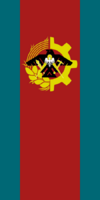Flag of Walzenia: Difference between revisions
(Created page with "{{Region_icon_Ajax}} {{Infobox flag | Name = Federated Commonwealth of Walzenia | Article = | Nickname = | Image = Flag of Walzenia modern.png | Use...") |
mNo edit summary |
||
| Line 31: | Line 31: | ||
=== Waltch Socialist Republic === | === Waltch Socialist Republic === | ||
[[File:Flag of Waltch Socialist Republic.svg|right|thumb|250px|The ''Moienrout'', adopted by the Waltch Socialist Republic in 1924.]] | [[File:Flag of the Waltch Socialist Republic.svg|right|thumb|250px|The ''Moienrout'', adopted by the Waltch Socialist Republic in 1924.]] | ||
=== Democratic Federation === | === Democratic Federation === | ||
[[File:Flag of Democratic Federation of Walzenia.svg|left|thumb|250px|The ''Ster en Tandwiel'', adopted by the Democratic Federation of Walzenia in 1953.]] | [[File:Flag of the Democratic Federation of Walzenia.svg|left|thumb|250px|The ''Ster en Tandwiel'', adopted by the Democratic Federation of Walzenia in 1953.]] | ||
Revision as of 11:41, 16 December 2020
| File:Flag of Walzenia modern.png | |
| Use | Civil and state flag |
|---|---|
| Proportion | 1:2 |
| Adopted | 12 December 1976 |
| Design | A red canvas on the first third of the hoist-side, with a black thunderbird holding a color hammer and torch; on the other two thirds, three alternating stripes of in the order of blue, red, and blue. |
The flag of Walzenia (Waltch: flagge vom Walzenja), also commonly referred to as the Moienrout (lit. Waltch: morning red), Dondervugel (thunderbird) and Balken en Wulleken (bars and wings), is the national flag of the Federated Commonwealth of Walzenia. It consists of a dark red canvas, with a black thunderbird on the hoist-side, and two horizontal, cyan-blue bars on the right-hand two-thirds. The flag was adopted on December 12th, 1976 as part of a package of decolonization reforms. It was designed by Wijome Meyer and won a contest and referendum for a new flag design the previous year.
The thunderbird, while not a universal symbol, is an important symbol and figure in the histories and belief systems of many of Walzenia's indigenous cultures. Specific legends and beliefs vary, but thunderbirds were typically mighty messengers of the Great Spirit who did battle with evil spirits, brought rainfall, and enjoyed heroic deeds. It was seen as a common symbol and thematically compared to the Waltch avalerion. The horizontal blue bars are a continuation of the vexillological tradition of the coat of arms of House Avaler, and, since the early 18th century, have been a non-aristocratic symbol of the Belisarian Waltch population. Combined with the red canvas, the two symbols together are considered to unify the two historic populations of Walzenia under the common cause of socialism.
Historical flags
Sovereign Colonies
Avalerian Republic
Waltch Socialist Republic
Democratic Federation
Other flags
| Flag | Date | Use | Description |
|---|---|---|---|
 |
1976-present | Hanging variant of national flag | A red canvas with narrow cyan stripes on both edges, featuring the federal seal in the center towards the top. |
 |
1976–present | Civil ensign and merchant flag | Alternating stripes of red and blue, three each. |
 |
1982–present | Naval ensign | Bisected into a blue half on the left, red half on the right, with a white design depicting a Mishibijiw in the left half. The Mishibijiw, often depicted as evil, extremely powerful water-dwelling spirits, was adopted as a symbol of the Federal Navy in the 1980s. Some believe that, by invoking the spirit on the ensign, sailors secure safe passage and redirect them towards their enemies. |
 |
1979-present | War flag, used by all branches of the Bondeweier | A red canvas featuring two black chevrons, with a black thunderbird on the hoist-side. |



